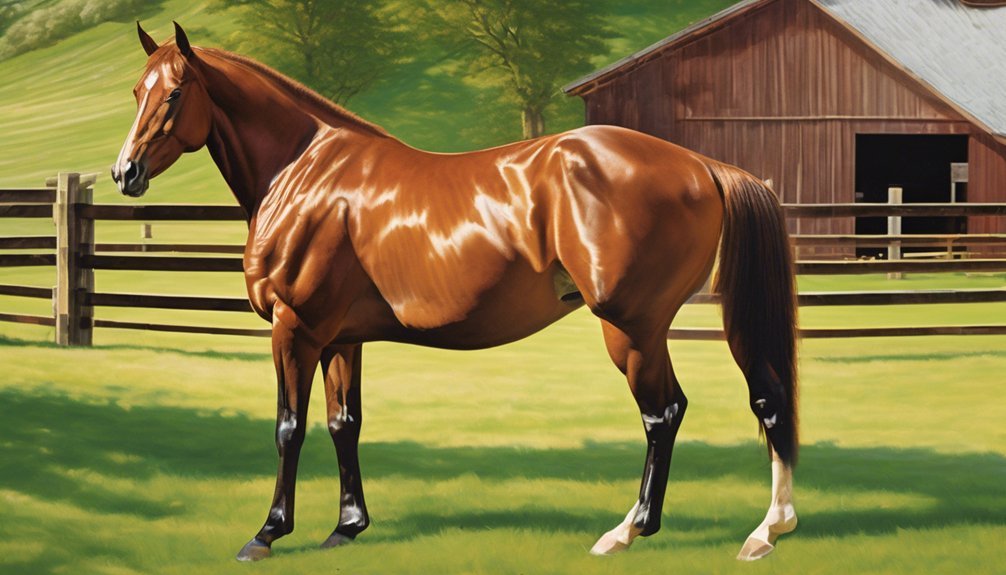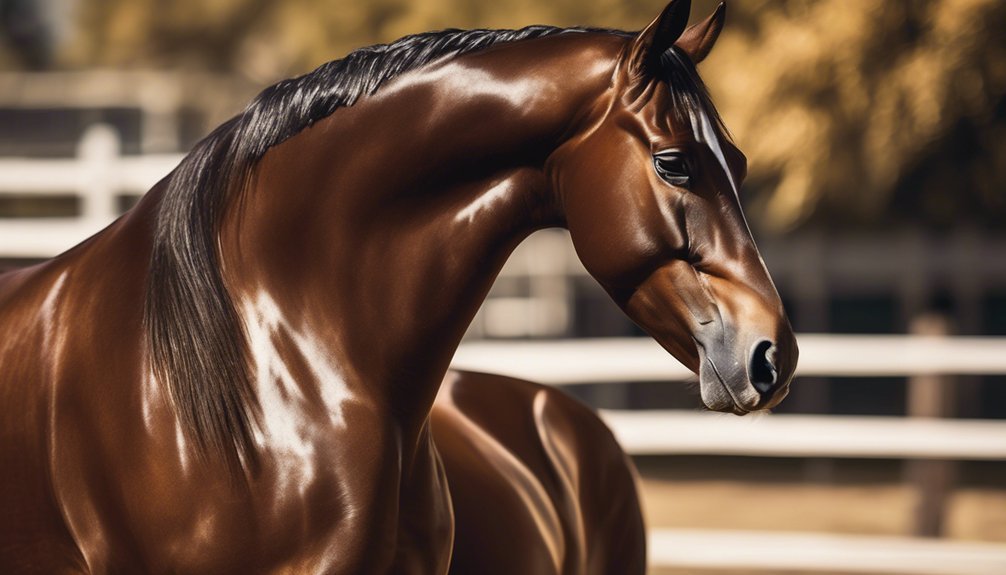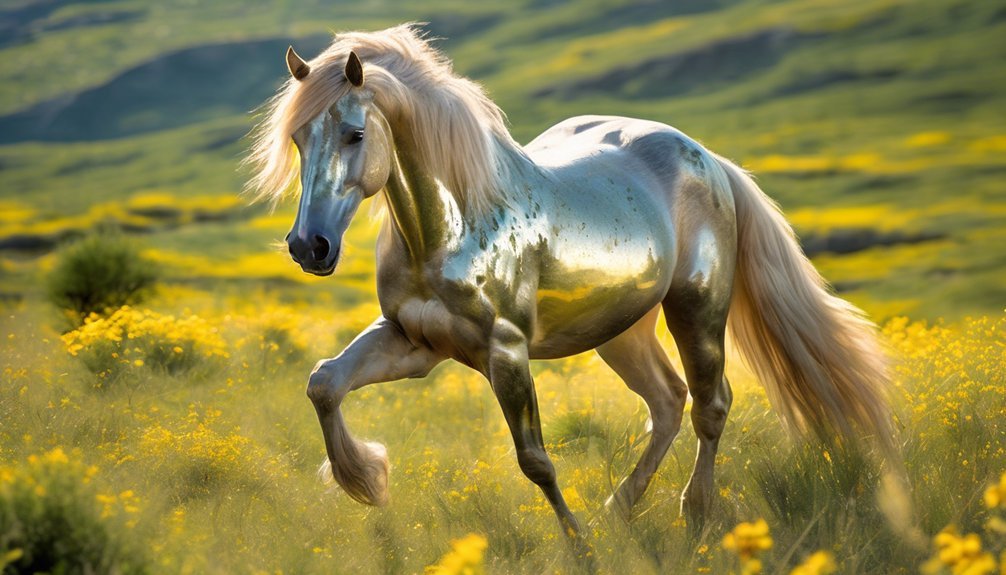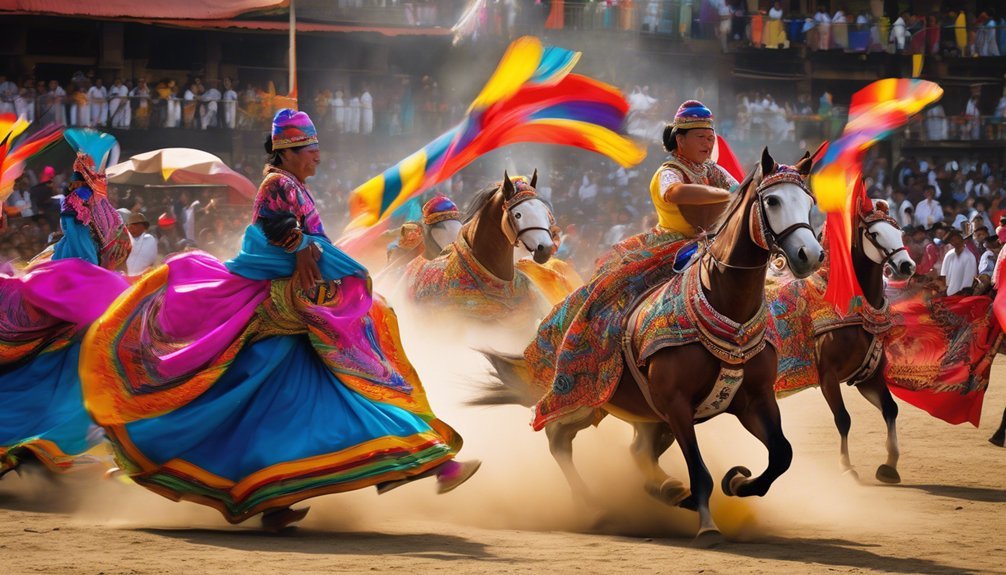
While some horses are valued for their companionship, others fetch millions due to their elite status and pedigree. You might wonder what drives such staggering prices in the equine market. It's not just about looks; factors like bloodlines, performance, and rarity play crucial roles. Understanding these elements can reveal why certain horses stand apart, often leading to astonishing price tags that capture the attention of affluent buyers and investors alike.
Key Takeaways
- Exceptional bloodlines and pedigree significantly enhance a horse's value, reflecting proven genetic potential and historical success.
- Elite training and skill development transform horses into high-performing athletes, increasing their market worth.
- Outstanding performance records and achievements, such as winning prestigious races, elevate a horse's reputation and desirability.
- Market demand and economic factors, including the allure of rare breeds, drive prices higher among affluent buyers.
- Celebrity status and effective marketing amplify a horse's visibility, making them more appealing as luxury investments.
The Importance of Bloodlines and Pedigree

When you delve into the world of high-value horses, you'll quickly realize that bloodlines and pedigree play a crucial role in determining their worth.
Understanding genetic diversity is essential; it helps ensure healthy offspring and enhances a horse's performance capabilities. When you trace lineage, you uncover stories of champions, revealing patterns that speak to a horse's potential.
A horse with a prestigious pedigree often comes with a legacy of success, making it more desirable in the marketplace. Breeders invest time and resources into maintaining these bloodlines, knowing that a horse's lineage can significantly influence its performance in competitions.
Exceptional Training and Skill Development
While bloodlines lay the foundation for a horse's potential, exceptional training and skill development elevate that potential to new heights.
When you watch a horse perform under the guidance of elite riders, you're witnessing the result of countless hours of dedicated training. These riders specialize in various disciplines, tailoring their approaches to unlock a horse's unique abilities.
Whether it's dressage, show jumping, or eventing, the training regimen is meticulously crafted to enhance skills and build trust between horse and rider. This bond is crucial; it allows the horse to respond intuitively to cues, showing off its talent.
Ultimately, it's this combination of elite training and specialized focus that transforms a promising horse into a million-dollar athlete.
Performance Records and Achievements
When you look at horses that cost millions, their performance records and achievements often stand out as key indicators of their value.
From impressive racing achievements to prestigious show jumping titles and breed championships, these accolades highlight their exceptional capabilities.
Understanding these accomplishments can give you greater insight into what makes these horses not just expensive, but truly extraordinary.
Racing Achievements
Although many horses command staggering prices, their true value often lies in their racing achievements.
When you dive into their racing history, you'll find that exceptional performance records can elevate a horse's worth to unimaginable heights. Winning legendary races like the Kentucky Derby or the Breeders' Cup can create a legacy that endears a horse to fans and collectors alike.
These milestones not only showcase a horse's raw talent but also its ability to withstand high-pressure situations. Each victory is a chapter in a story that resonates with enthusiasts, making these horses not just athletes but icons.
In the world of equestrian sports, it's these achievements that truly define a horse's worth, far beyond its physical presence.
Show Jumping Titles
Show jumping is a thrilling discipline where athletes often compete for prestigious titles and accolades.
When you look at the top-tier show jumpers, you'll notice their impressive performance records often include Olympic medals. These accomplishments not only highlight their skill but also elevate their market value significantly.
Each title represents countless hours of training, dedication, and partnership between horse and rider. A horse with a history of success in Grand Prix events or championship shows tends to attract attention and admiration, making them highly sought after.
The combination of innate talent and proven achievements in show jumping creates a compelling narrative, driving prices into the millions.
Ultimately, these titles are more than just ribbons; they're a testament to excellence in the equestrian world.
Breed Championships
While many factors contribute to a horse's value, breed championships stand out as key indicators of performance and achievement. When a horse earns championship titles, it demonstrates not only adherence to breed standards but also exceptional skill and capability.
These accolades serve as a testament to the horse's training, bloodlines, and overall potential in the competitive arena. Buyers often look for these achievements as a mark of quality, as they signify a horse's ability to excel under pressure and against strong competition.
The prestige associated with breed championships elevates a horse's desirability, translating into higher market prices. Ultimately, the combination of impressive performance records and championship titles can dramatically enhance a horse's value, making it a worthy investment for serious equestrians.
Rarity and Uniqueness of the Breed

When you delve into the world of high-value horses, the rarity and uniqueness of certain breeds become strikingly apparent. The breed characteristics set these exceptional animals apart, often highlighting extraordinary traits like strength, agility, or temperament.
This uniqueness isn't just about physical attributes; it's also about the historical significance tied to each breed. For instance, some breeds have a legacy of excellence in competitive arenas or have been cherished by royalty.
Their limited numbers and storied past contribute to their allure and value. When you consider these factors, it's clear why certain horses command such staggering prices.
Owning a rare breed isn't merely about having a horse; it's about possessing a piece of history and a symbol of prestige.
Market Demand and Economic Factors
As the demand for high-value horses continues to rise, understanding the economic factors at play becomes crucial.
Market trends indicate that buyers are increasingly seeking exceptional bloodlines, performance records, and unique traits. This surge in interest drives up prices, as sellers adopt effective pricing strategies to capitalize on the growing competition.
You'll notice that elite events and competitions often influence market dynamics, creating a ripple effect on horse values. Additionally, the influence of affluent buyers, who view horses as status symbols, can't be ignored.
When you grasp these economic factors, you not only appreciate the price tags but also the intricate interplay of desire and investment that shapes the equine market today.
Investment Potential and Value Appreciation
When you consider investing in high-value horses, rare bloodlines and genetics play a crucial role in determining their worth.
A horse's success in performance and competition not only enhances its reputation but also significantly boosts its market value.
Understanding these factors can help you make informed decisions and maximize your investment potential.
Rare Bloodlines and Genetics
While many factors influence a horse's market value, rare bloodlines and genetics often stand out as key determinants of investment potential and future appreciation.
Understanding the significance of lineage can deepen your appreciation for a horse's worth. Horses with unique bloodlines provide genetic diversity, which is crucial for breeding programs aiming to produce exceptional offspring.
When you invest in a horse with a rare lineage, you're not just buying a horse; you're acquiring a piece of history and potential. This uniqueness can lead to increased demand over time, enhancing value appreciation.
Performance and Competition Success
Investing in horses with rare bloodlines is just one piece of the puzzle; performance and competition success significantly influence a horse's market value.
A horse that consistently performs well in competitions demonstrates not just talent but also a competitive edge that attracts buyers. You'll find that performance consistency is key—those horses that regularly place in top positions are seen as valuable assets, promising a return on investment.
This consistent success builds a horse's reputation, which can lead to increased demand and value appreciation over time.
Celebrity Status and Media Influence
As the world of equestrian sports gains more visibility, the celebrity status of certain horses skyrockets, drawing immense media attention. Their allure isn't just about their performance; it's also how they're portrayed in the media and leveraged through celebrity endorsements.
You might envision:
- A majestic stallion gracing magazine covers, its glossy coat shimmering under the spotlight.
- A powerful mare, featured in viral videos, captivating audiences worldwide.
- An elite horse strutting down red carpets, surrounded by trainers and celebrities.
- Stunning photoshoots, showcasing their athleticism while paired with glamorous riders.
These elements create an irresistible narrative, amplifying their market value as fans and investors alike become enthralled by their stories and prestige.
Frequently Asked Questions
How Do Age and Health Affect a Horse's Price?
Age impacts a horse's price significantly; younger horses often hold more potential for training and competition. Health considerations also play a crucial role, as a healthy horse is more desirable and likely to command a higher price.
What Role Does the Seller's Reputation Play in Pricing?
Seller credibility significantly shapes pricing; a trustworthy seller often draws discerning buyers. When market demand's high, reputation enhances perceived value, creating a compelling connection between a seller's stature and the horse's ultimate selling price.
Are There Financing Options Available for Purchasing Expensive Horses?
Yes, you can explore financing options like horse loans to make your purchase easier. Integrating smart investment strategies can help manage costs while ensuring you secure that dream horse without breaking the bank.
How Do Different Disciplines Influence a Horse's Value?
Think of a horse as a canvas; its value reflects the artistry of its discipline. Dressage excellence and jumping ability shape perceptions, with each skill enhancing the horse's allure and potential market worth.
What Are Common Misconceptions About High-Priced Horses?
You might think high-priced horses are always the product of elite breeding myths or flawless training misconceptions. In reality, their value often stems from unique traits, skills, and the rider's connection, not just lineage or training hype.
Conclusion
In the world of elite equines, horses that cost millions aren't just animals; they're living legacies, each with a story woven into their pedigree. Their exceptional training, remarkable performance, and unique traits elevate them to status symbols coveted by affluent buyers. As market demand surges, these majestic creatures transform into investments that appreciate like fine art, captivating both enthusiasts and investors alike. Ultimately, their value reflects not just their worth, but the dreams and aspirations they carry on their powerful backs.





